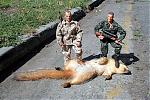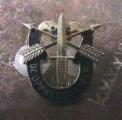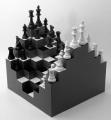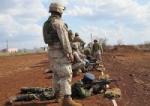No, it sounds more like we are in a violent civil war with lots of innocent people being killed, sometimes because they don't to do what some pathological teenager wants them to do fast enough or because a village mullah has decided he knows God's will better.
The border is a reality that is recognized by both sides, grudgingly maybe on the Afghan side but it isn't seriously contested. I would guess the Pakistanis are rather more concerned about maintaining it as it is more than anybody.
The point of your Pashtun comment is to suggest that the Pakistanis aren't foreigners coming over to Afghanistan to kill locals on behalf of Taliban & company. From what I read, the Afghans know full well who is a Pakistani coming over to mess around in somebody else's neighborhood, not to mention various volunteers from over the ocean who show up from time to time.
You might want to change your "white men" reference to "europeans". My auntie was a missionary for decades in Pakistan. She was as fair skinned as the daughter of an Irishman could be. The Pakistanis always used to ask her if she was a Pathan.
You suggest "this" is about the interests of the Afghans. And you mention the Taliban & company's cause. That cause is from what I read an Islamist Afghanistan ruled by Kandaharis, not much evidence that it will be much different from what it was pre-2001. Most of the Afghans disliked that intensely and don't want it to come back.
You also say the Pak Army/ISI supports the cause of Taliban & company. Now, the Pak Army/ISI supports a cause which most Afghans view as inimical to their interests, and since you say we should promote solutions that serve the entire populace, shouldn't we therefore oppose the Pak Army/ISI's support for Taliban & company? This might possibly dovetail with our interests, since the Taliban was in charge of most of Afghanistan they hosted a group that killed 3,000 of our people and have never renounced that group.
In your parenthetical I think you are slanting things a bit. We, by deferring to the ISI, backed with most of the money the most religious muj groups. Gulbuddin and the boys comes to mind. And I believe Ismail Khan over there in Herat killed a lot of Russ. The Taliban doesn't like him at all. Also I might add that Massoud was the key leader in the Northern Alliance. He was not pro-Russian either judging by the number of their bodies he left on various battlefields. Not simple these things.









 ......
......






Bookmarks